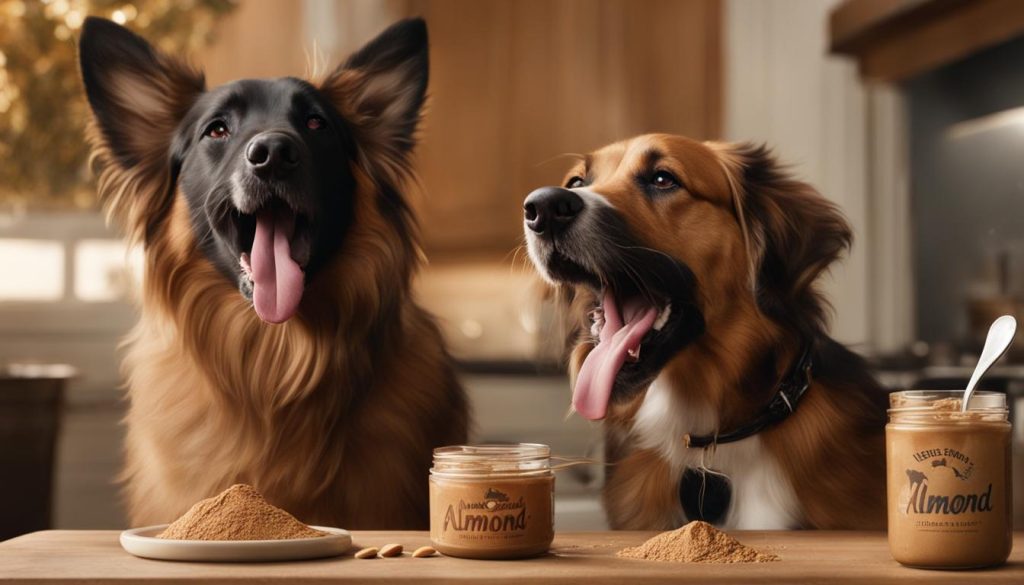As a dog owner, you may have wondered whether it’s safe to share almond butter with your furry friend. After all, almond butter is a popular and delicious treat for humans. But can dogs have almond butter too?
Well, the answer is yes, but with some important considerations. While almond butter can provide certain health benefits for dogs, it should be given in moderation and with caution. Let’s dive deeper into the topic and find out what the experts have to say!
Key Takeaways:
- Almond butter is safe for dogs in moderation.
- It provides health benefits such as vitamin E and minerals.
- Check for toxic additives like xylitol before feeding almond butter to your dog.
- High in fat and calories, almond butter should be given sparingly to prevent weight gain and other health issues.
- Consult your vet for specific recommendations on serving sizes and frequency of almond butter treats.
Is Almond Butter Safe for Dogs?

When it comes to sharing our favorite foods with our furry friends, it’s important to consider their safety and well-being. One question that often comes up is whether almond butter is safe for dogs to consume. The answer is yes, but with a few important considerations.
Almond butter can be a nutritious addition to your dog’s diet when given in moderation. It contains beneficial nutrients such as vitamin E and minerals that can support their overall health. However, it’s essential to remember that almond butter is high in calories and fat, so it should be given as an occasional treat rather than a mainstay in their diet.
It’s crucial to avoid almond butter products that contain toxic additives like xylitol, which can be harmful to dogs. Always check the label and choose natural almond butter with minimal ingredients. Additionally, if your dog has any specific dietary concerns or health conditions, it’s best to consult with your veterinarian before introducing almond butter into their diet.
The Benefits and Risks of Almond Butter
While almond butter does offer some nutritional benefits for dogs, it’s essential to be aware of the potential risks as well. The table below provides a summary of the benefits and risks associated with feeding almond butter to dogs:
| Benefits of Almond Butter for Dogs | Risks of Almond Butter for Dogs |
|---|---|
| Contains vitamin E and minerals | High in calories and fat |
| Supports overall health | Xylitol, a toxic additive, can be present |
| Can be used as an occasional treat | Potential for weight gain and pancreatitis |
As with any food, it’s important to introduce almond butter gradually and observe how your dog reacts to it. If they enjoy it and tolerate it well, you can continue to offer it as an occasional treat. Always pay attention to their weight and overall health to ensure they maintain a balanced diet.
Remember, moderation is key when it comes to sharing almond butter with your furry friend. By following these guidelines and consulting with your veterinarian, you can safely incorporate almond butter into your dog’s diet and provide them with a tasty and nutritious treat.
Almond Butter vs. Peanut Butter for Dogs
When it comes to nut butters for dogs, almond butter and peanut butter are popular choices. Both options can be given to dogs in small quantities and can serve as occasional treats. However, there are a few differences to consider when deciding between the two.
Firstly, let’s talk about the nutritional benefits. Almond butter contains higher amounts of vitamin E compared to peanut butter, which is known for its antioxidant properties. Vitamin E helps promote a healthy coat, skin, and immune system in dogs. On the other hand, peanut butter offers a good source of protein and healthy fats.
In terms of taste, some dogs may show a preference for almond butter over peanut butter, while others may enjoy the peanutty flavor more. It ultimately depends on your dog’s individual taste preferences, so it’s worth experimenting with both options to see which one your furry friend enjoys the most.
| Nut Butter | Nutritional Benefits | Taste Profile |
|---|---|---|
| Almond Butter | High in vitamin E for a healthy coat, skin, and immune system | Rich and nutty flavor |
| Peanut Butter | Good source of protein and healthy fats | Classic peanutty taste |
When choosing between almond butter and peanut butter, consider the specific needs and preferences of your dog. Both options can be incorporated into their diet as long as they are given in moderation. Remember to always check the labels for any harmful additives, such as xylitol, which can be toxic to dogs.
Precautions When Giving Dogs Almond Butter

Feeding almond butter to dogs can be a delicious and healthy treat, but it’s important to take precautions to ensure their well-being. Here are some key considerations to keep in mind:
1. Feed in moderation:
While almond butter can provide nutritional benefits for dogs, it is high in fat and calories. To prevent weight gain and other health issues, it should be given sparingly as an occasional treat. Portion control is essential to maintain a balanced diet.
2. Check for toxic additives:
When selecting almond butter for your furry friend, always read the label and avoid products that contain toxic additives like xylitol. Xylitol is extremely dangerous for dogs and can lead to severe health problems, including liver damage. Opt for natural almond butter with minimal ingredients to ensure your dog’s safety.
3. Stir thoroughly before giving:
Before offering almond butter to your dog, make sure to stir it thoroughly. This helps distribute the oils and prevents your dog from consuming a concentrated amount at once. Consistency is key to ensure a safe and enjoyable treat for your canine companion.
By following these precautions, you can safely incorporate almond butter into your dog’s diet as a natural and tasty treat. Remember to consult with your veterinarian for specific recommendations based on your dog’s individual needs and health condition.
Table: Almond Butter Precautions for Dogs
| Precautions | Explanation |
|---|---|
| Feed in moderation | Almond butter is high in fat and calories, so it should be given sparingly to prevent weight gain. |
| Check for toxic additives | Avoid almond butter with xylitol, a toxic additive that can be harmful to dogs. |
| Stir thoroughly before giving | Make sure to stir almond butter thoroughly to ensure an even distribution of oils. |
How to Give Dogs Almond Butter
When it comes to treating your canine companion to almond butter, there are several creative ways to incorporate it into their diet. Not only does almond butter make for a delicious and healthy treat, but it can also offer mental stimulation and provide a fun way to interact with your dog.
Making Homemade Dog Treats
One great way to give dogs almond butter is by using it as an ingredient in homemade dog treats. You can find numerous recipes online that include almond butter as a key component. From simple no-bake treats to baked goodies, the options are endless. Just make sure to follow recipes that are safe for dogs and avoid any ingredients that could be toxic to them.
Using Almond Butter as a Medication Concealer
If your dog requires medication, almond butter can be a handy tool for concealing pills. Simply spread a thin layer of almond butter on a spoon or the back of your hand, place the pill in the center, and then fold it over to create a “pill pocket.” Your dog will likely be more eager to take their medication when it’s wrapped in tasty almond butter.
Food-Dispensing Toys
Food-dispensing toys are a great way to keep your dog mentally stimulated and entertained. You can fill these toys with almond butter and let your dog work to retrieve the tasty treat. It not only provides physical exercise but also challenges their problem-solving skills. Just ensure that the toy is safe for your dog’s size and that they don’t consume too much almond butter at once.
As with any treat, moderation is key. While almond butter can be a healthy addition to your dog’s diet, too much of it can lead to weight gain and potential health issues. Always consult with your veterinarian to determine the appropriate serving size and frequency of almond butter treats for your furry friend.
Risks of Giving Dogs Almond Butter

While almond butter can be enjoyed by dogs in moderation, there are a few risks that pet owners should be aware of. The first and most important risk is the potential presence of xylitol in almond butter. Xylitol is a sweetener commonly used in many human food products, including some brands of almond butter. However, xylitol can be toxic to dogs, leading to symptoms such as vomiting, loss of coordination, seizures, and even liver damage. It is crucial to always check the label and ensure that the almond butter you are giving to your dog does not contain xylitol.
In addition to the risk of xylitol, almond butter is high in fat and calories. While dogs require fat in their diet, excessive consumption of high-fat foods like almond butter can lead to weight gain and obesity. Overweight dogs are at a higher risk of developing various health issues, including diabetes, joint problems, and heart disease. Therefore, it is important to feed almond butter to dogs sparingly and in moderation.
Another potential risk of giving dogs almond butter is the development of pancreatitis. Pancreatitis is an inflammation of the pancreas that can be triggered by the consumption of high-fat foods. Dogs with pancreatitis may experience symptoms such as abdominal pain, loss of appetite, vomiting, and diarrhea. To prevent pancreatitis, it is best to limit the amount of almond butter and other high-fat treats given to dogs.
| Risks of Giving Dogs Almond Butter | Precautions to Take |
|---|---|
| Potential presence of xylitol | Always check the label for xylitol and choose almond butter that does not contain this toxic ingredient. |
| High in fat and calories | Feed almond butter sparingly to prevent weight gain and obesity. Consider the overall calorie and fat intake of your dog’s diet. |
| Risk of pancreatitis | Limit the amount of almond butter given to dogs to minimize the risk of pancreatitis. Monitor for symptoms and consult a vet if any concerns arise. |
To summarize, while almond butter can be safe for dogs in moderation, it is crucial to be aware of the potential risks. Always check for xylitol in almond butter and choose natural varieties without this harmful ingredient. Feed almond butter sparingly to avoid weight gain and pancreatitis. It is important to prioritize your dog’s health and consult a veterinarian for specific recommendations regarding almond butter and your dog’s individual dietary needs.
Signs of a Dog Liking Almond Butter

When it comes to dogs and almond butter, there are some clear signs that indicate whether or not they enjoy this delicious treat. Dogs may show their excitement for almond butter in various ways, such as wagging their tail, licking their lips, or pacing around the kitchen in anticipation. These behaviors are a clear indication that your furry friend is eager to indulge in some almond butter goodness.
While many dogs are known to love peanut butter, some may actually prefer the flavor of almond butter. Each dog has their own unique taste preferences, and almond butter provides a slightly different taste compared to peanut butter. So, if your dog shows a particular liking for almond butter, it’s perfectly normal and just means they have their own personal favorite.
Introducing your dog to almond butter can be a delightful experience for both of you. You can experiment with different ways of serving almond butter to see which one your dog enjoys the most. Whether it’s spreading it on a lick mat, using it to hide a pill, or adding it to homemade dog treats, there are plenty of ways to incorporate almond butter into your dog’s diet.
Can Dogs Eat Almond Butter?
Yes, dogs can eat almond butter, but it should be given in moderation. Almond butter is high in fat and calories, so it’s important to limit the amount you offer to your furry friend. Feeding too much almond butter can lead to weight gain and other health issues. Additionally, it’s crucial to choose almond butter that does not contain any toxic additives like xylitol, which can be harmful to dogs.
Almond Butter for Dogs
Almond butter offers some nutritional benefits for dogs. It contains vitamin E and minerals that are beneficial for their overall health. However, it’s important to remember that almond butter should be considered as an occasional treat and not a staple in their diet. Always consult with your veterinarian before introducing any new food items to your dog’s diet to ensure it aligns with their specific dietary needs.
| Signs of a Dog Liking Almond Butter: |
|---|
| Wagging their tail |
| Licking their lips |
| Pacing around the kitchen |
History of Almond Butter and Dogs

Almonds have a long and storied history, dating back thousands of years. Ancient civilizations such as the Egyptians and Greeks cultivated almonds for consumption. These nutrient-dense nuts were enjoyed not only by humans but also by our canine companions. The rich history of almonds and their popularity led to the creation of almond butter, a delicious spread that dogs have come to love.
Almond butter became a dog-friendly alternative to peanut butter, offering a different flavor profile and texture. Some dogs may even prefer the taste of almond butter over other nut butters, making it a popular choice for training or as a special treat. Dogs have their own unique taste preferences, and almond butter provides a tasty option that can be enjoyed in moderation.
As almond butter gained popularity among dog owners, it became evident that dogs have a real liking for this delicious spread. They show their appreciation through wagging tails, licking their lips, and even pacing around the kitchen when almond butter is brought out. Each dog may have their own individual preference when it comes to almond butter, just as humans have their favorite foods. It’s always a joy to see our furry friends enjoy a special treat like almond butter.
“Dogs have their own unique taste preferences, and almond butter provides a tasty option that can be enjoyed in moderation.”
Science Behind Dogs and Almond Butter

When it comes to the health benefits of almond butter for dogs, there is science to support its inclusion in their diet. Almond butter contains essential vitamins and minerals that contribute to overall canine nutrition. One of the key components is vitamin E, which plays a crucial role in maintaining healthy skin and coat, as well as supporting the immune system. Additionally, almond butter provides minerals such as magnesium and calcium, which are essential for strong bones and teeth.
The vitamin E content in almond butter also acts as an antioxidant, helping to remove harmful free radicals from cells. These free radicals can damage cells and contribute to aging and disease. By including almond butter in moderation, dogs can experience the antioxidant benefits that promote overall well-being. Please be aware that while almond butter can enhance canine nutrition, it should always be given in appropriate quantities to avoid weight gain and related health issues.
Incorporating almond butter into a dog’s diet can be as simple as using it as a treat or adding it to homemade dog treats. Many dogs enjoy the taste of almond butter, and it can be a healthy alternative to other high-calorie treats. However, it’s crucial to choose natural almond butter without any additives or toxic ingredients such as xylitol, which can be harmful to dogs. Always check the label and choose a reputable brand when selecting almond butter for your furry friend.
Benefits of Almond Butter for Dogs:
- Provides essential vitamins like vitamin E
- Offers minerals such as magnesium and calcium for strong bones and teeth
- Acts as an antioxidant to remove harmful free radicals
- Can be used as a healthy treat or ingredient in dog treats
- Avoid additives and choose natural almond butter
To summarize, almond butter can be a beneficial addition to a dog’s diet, providing essential nutrients and promoting overall health. When given in moderation and as part of a balanced diet, almond butter can be a tasty and nutritious treat for dogs. Remember to consult with your veterinarian for specific recommendations on serving sizes and frequency based on your dog’s individual health and dietary needs.
Training Dogs to Eat Almond Butter
Introducing almond butter as a treat to your dog can be a fun and rewarding experience. However, it’s important to take some precautions and follow a few steps to ensure that your furry friend enjoys almond butter safely. Here are some guidelines to help you train your dog to eat almond butter:
1. Choose natural almond butter without additives: When selecting almond butter for your dog, it’s crucial to choose a natural variety without any potential toxic additives like xylitol. Xylitol can be harmful to dogs and should be avoided at all costs. Natural almond butter with minimal ingredients is the best option for your pet.
2. Limit the amount of almond butter: Almond butter is high in calories and fat, so it’s essential to feed it to your dog in moderation. Giving too much almond butter can lead to weight gain and other health issues. As an occasional treat, a small amount of almond butter can be a delightful addition to your dog’s diet.
3. Consult your vet for serving sizes: Each dog is unique, and their dietary needs vary. It’s always a good idea to consult your veterinarian to determine the appropriate serving size of almond butter for your dog. Your vet will consider your dog’s size, weight, and overall health to provide personalized recommendations.
Remember that almond butter should only be given as a treat and not as a substitute for a balanced diet. By following these training tips, you can safely introduce almond butter to your dog and provide them with a delicious and healthy snack.
Wrapping Up
To summarize, almond butter can be a safe and nutritious treat for dogs when given in moderation. It offers some health benefits, such as vitamin E and minerals, which support overall canine health. However, due to its high fat and calorie content, almond butter should be given sparingly to prevent weight gain and other health issues.
When choosing almond butter for dogs, it is important to check the label for any toxic additives, especially xylitol, which can be harmful to dogs. Opt for natural almond butter with minimal ingredients to ensure the safety and health of your furry friend.
Consulting with a veterinarian is always a wise idea to get specific recommendations on serving sizes and frequency of almond butter treats based on your dog’s individual health and diet. With proper precautions and moderation, dogs can enjoy the occasional treat of almond butter as part of a balanced diet.
FAQ
Can dogs have almond butter?
Yes, dogs can have almond butter in moderation.
Is almond butter safe for dogs?
Almond butter is safe for dogs when given in small amounts.
Can dogs eat almond butter?
Yes, dogs can eat almond butter, but it should be given sparingly.
Is almond butter safe for dogs?
Yes, almond butter is safe for dogs when consumed responsibly.
Is almond butter safe for dogs?
Yes, almond butter is safe for dogs when given in moderation.
Is almond butter safe for dogs?
Yes, almond butter is safe for dogs when consumed in moderation.
Almond butter vs. peanut butter for dogs, which is better?
Both almond butter and peanut butter can be given to dogs in small quantities.
Almond butter vs. peanut butter for dogs, which is healthier?
Almond butter and peanut butter offer similar nutritional benefits for dogs.
Almond butter vs. peanut butter for dogs, which is more expensive?
Almond butter tends to be more expensive than peanut butter.
What precautions should I take when giving dogs almond butter?
Feed almond butter in small quantities to prevent weight gain and upset stomach. Check for toxic additives like xylitol.
How can I incorporate almond butter into my dog’s diet?
You can use almond butter to make homemade dog treats or mix it with other ingredients. It can also be spread on a lick mat or used to hide a pill.
What are the risks of giving dogs almond butter?
Almond butter with xylitol can be toxic, and almond butter without xylitol can lead to weight gain and pancreatitis.
What are the signs of a dog liking almond butter?
Dogs may show signs of liking almond butter, such as wagging their tail, licking their lips, and pacing around the kitchen.
What is the history of almond butter and dogs?
Almonds have been enjoyed by humans and dogs for thousands of years, and almond butter has gained popularity as a dog-friendly alternative to peanut butter.
What is the science behind dogs and almond butter?
Almond butter offers several health benefits for dogs, including essential vitamins and minerals that support overall health.
How can I train my dog to eat almond butter?
Almond butter can be introduced as a treat and incorporated into training sessions for your dog.






